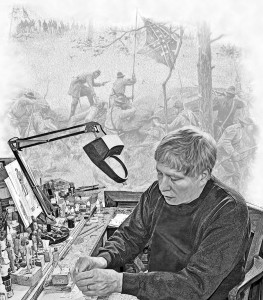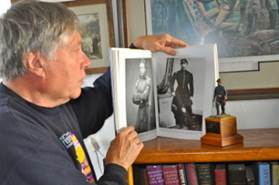Adhere to your purpose and you will soon feel as well as you ever did. On the contrary, if you falter and give up, you will lose the power of keeping any resolution, and will regret it all your life.
* Abraham Lincoln
It had been a tough trip! Paul had flown across the country from San Francisco to Washington, D.C. on his way to one final tour of the Civil War battlefields at Gettysburg. His Parkinson’s was getting worse, and he was no longer steady on his feet. He also had a bad knee that made walking distances a problem, so he used wheelchairs in the airports, traveled with a cane (which he called his “stupid cane”), and took a series of pills every four hours to keep the involuntary movement to a minimum. But Paul’s spirits were high when he finally rolled into Gettysburg.
Paul Meuse had done this trip many times, but not recently. Passionate about the Civil War, Paul had hundreds of books about it and he was knowledgeable about every major campaign. Among his Civil War friends, Paul was best known for creating military miniatures, or four-inch replicas of soldiers in battle. He crafted these beautiful life-like reproductions for years, preserving forever the warriors and their moments in time. His friends covet the miniatures Paul made for them.

Creating miniatures had never been easy, but it had been especially hard for Paul the past few years. His Parkinson’s was getting worse, and he was having a hard time forming and painting the soldiers. But he kept after it.
He kept after his trip to Gettysburg, too. He was exhausted when he arrived, but he perked up once he hit the battlefields. Over the next three days, Paul followed the battles in sequence, re-living where each division of Union and Confederate troops was positioned, recalling the names of the brigade commanders, and re-playing the strategy each side used to place and move artillery and troops.
When he reached the third (and final) day of fighting, Paul got excited; this was the climax of the battle and the crux of the war. He went through the battlefields, stopping next to the monuments of his favorite brigades. When he could first see Little Round Top, he stared up the hill that had decided so much for so many people. He drove up the hill, parked near the top, and got out. He shambled to the edge of the parking lot and stood looking down the hill, going over in his mind where the Union and Confederate troops had been positioned, and how the action had unfolded. After a few minutes, Paul started for his car. But then he stopped, leaned a little on his stupid cane, and turned around. Taking a deep breath, he slowly made his way back up the hill. He hadn’t come all this way to not go to the peak of Little Round Top! So Paul used his stupid cane, his one good knee, and a whole lot of determination to march back up the path, and he kept going until he reached the top.
Once there, a new look came over Paul’s face. It was a mix of pain, exhaustion, and joy. This was his nirvana, the ground he knew so well. He hobbled over to an elderly couple and stood beside them. After a minute, he asked if this was their first time here. When they said yes, Paul replied good — I’ve wanted to tell someone about it. Then he told them the story of the battle for Little Round Top. He waved his arms, showing where the troops from Alabama had charged up the hill, and where they were met by round-after-round of deadly rifle fire by the northern troops. He pointed out where the Northern Iron Brigade defending the hill had run out of ammunition and been ordered to fix bayonets and charge down the hill, into the waves of approaching Confederate troops.
He made it come alive.
 When he finished his story, the couple was silent for a while. They thanked him and made their way down the hill to their car. Still Paul held his ground, staring down the hill. His face had an expression of satisfaction. He had come to the spot that meant so much to him for one more look, he had passed the story on, and that was what he needed. He took a deep breath and smiled, then slowly made his way back to his car and his hotel. He slept well that night, dreaming of bugles and battlefields.
When he finished his story, the couple was silent for a while. They thanked him and made their way down the hill to their car. Still Paul held his ground, staring down the hill. His face had an expression of satisfaction. He had come to the spot that meant so much to him for one more look, he had passed the story on, and that was what he needed. He took a deep breath and smiled, then slowly made his way back to his car and his hotel. He slept well that night, dreaming of bugles and battlefields.
Paul died less than a year after his trip. He and his wife were watching TV one night and he slumped over in his chair. His heart had given out. He never asked to go to Gettysburg again. He had that one last trip and he knew another would be too hard. And he stopped creating miniatures, which finally got to be too much for him.
At his memorial service, friends said a lot of nice things about Paul. Some talked about his courage, and how he continued to do the things he loved, despite being sick. Others said that while he struggled, he never complained. A friend and fellow Civil War buff said Paul was a warrior; strong in a way that heroes are strong.
Paul fought for his country (he served in the U.S. Army, First Calvary Division, during the Vietnam War), struggled to support a family, scrapped to make a living, and followed his passion. And through it all he fought to preserve his way of life – and his favorite moments in time.




